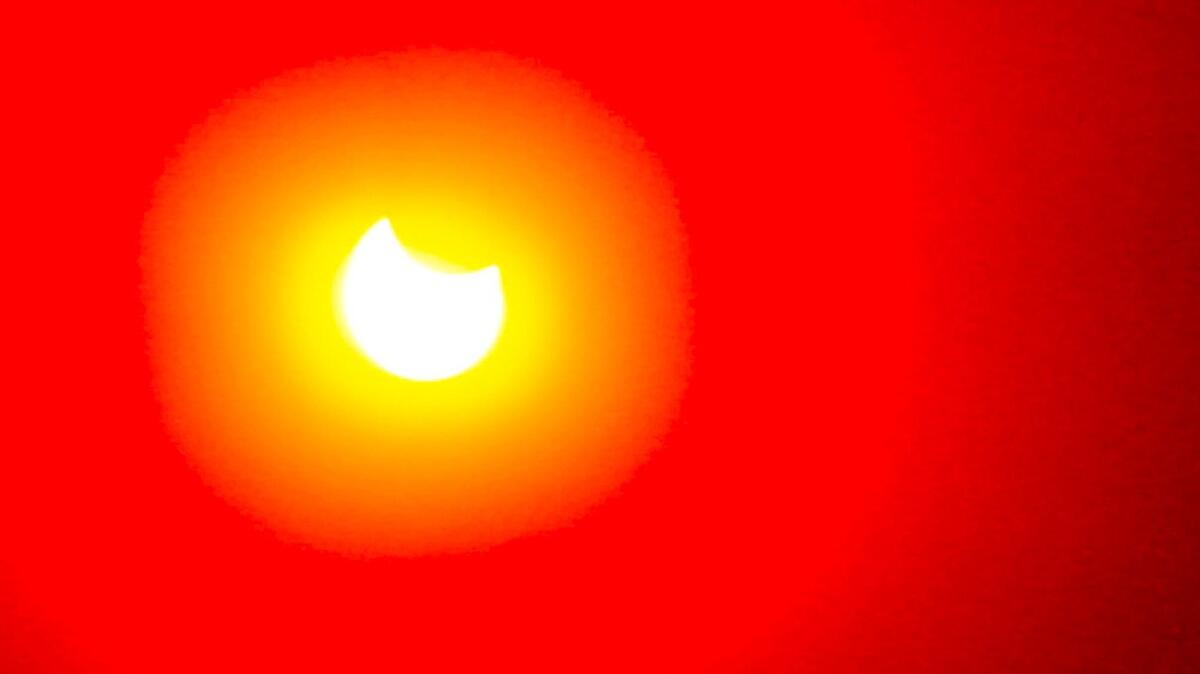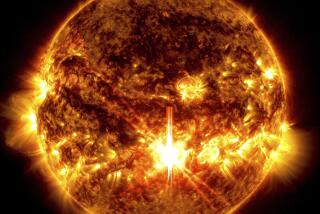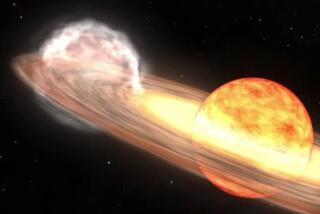Californians can expect to see a partial (not total) solar eclipse. Here are 8 places to go and watch

When a solar eclipse begins to hit the U.S. on Monday, nowhere in California will witness totality, the time when the moon completely blacks out the sun for a few minutes.
Total darkness will first be experienced in North America in Salem, Ore., around 10:18 a.m. PDT. The eclipse’s path of totality runs along a 70-mile-wide band across the U.S., starting in Oregon and ending in South Carolina.
About 12 million people live within the area where the eclipse will be at its darkest. Californians will not be among them, but residents of the Golden State will be able to see a partial eclipse.
New Pine Creek, a northeastern town near the Oregon border, and Yreka and Crescent City in the north will experience more than 90% darkness at the eclipse’s peak — if clouds or fog don’t obscure the sky.
In San Francisco, the moon will cover about 75% of the sun. In Los Angeles, the eclipse will cause little celestial drama with about a 62% partial eclipse, peaking at 10:21 a.m.
Tyler Nordgren, professor of physics and astronomy at the University of Redlands, wrote in an email that “62% isn’t that noticeable in the sky (unless you have your eclipse glasses). But, if you begin to look around at shadows of trees or bushes on the ground, you’ll see all sorts of glowing crescents on the ground at the maximum point of the eclipse.”
If you haven’t made plans to see the total eclipse, here are eight viewing parties to celebrate the partial eclipse. And remember: Wherever you watch, you’ll need eclipse safety glasses to protect your eyes.
--Big Bear Lake: Head over to the eastern parking lot at Swim Beach at 41220 Park Ave., where members of the local astronomical society will set up telescopes to better view the partial eclipse, which should peak around 10:23 a.m. They’ll also provide safe viewing glasses too.
--Mammoth Lakes: The Mammoth Mountain ski area at 10001 Minaret Road invites folks to the 11,053-foot summit to watch the eclipse. Visitors may take the gondola to the top starting at 9 a.m. ($23 for adults, $10 for kids 13 and older; the visit includes safe viewing glasses). The moon will block out about 80% of the sun in this area, peaking at 10:20 a.m.
--Los Angeles: Take a hike from the Gateway to Nature Center at 130 Paseo de La Plaza starting at 8:30 a.m. Rangers will lead visitors to nearby L.A. State Historic Park at 1245 N. Spring St. to watch the eclipse.
--Los Angeles: The Griffith Observatory in Griffith Park will host a free eclipse party with viewing from the lawn, sidewalks and on the solar telescope in the Hall of the Sky. The event lasts from 9 a.m. to noon.
--Calabasas: The Santa Monica Mountains Recreation Area will host a free ranger program about the eclipse at the visitor center at 9:30 a.m., followed by viewing of the partial eclipse. The program takes place at the King Gillette Ranch, 26867 Mulholland Highway.
--Thousand Oaks: Rangers will host children’s activities, tell Native American stories about the sky and lead eclipse-watching starting at 9:30 a.m. Meet at the Satwiwa Native American Indian Culture Center near Via Goleta and Lynn Road.
--San Francisco: A 9 a.m.-to-noon eclipse-watching boat party on San Francisco Bay has sold out, but there are other places in the city to watch the partial eclipse, expected to be about 80%.
The Exploratorium at the Embarcadero and Green Street will open early at 9 a.m. for an eclipse-viewing event that runs until noon. Visitors can watch the eclipse on the museum’s plaza (telescopes and safety glasses provided). You’ll also be able to see live streams of totality from Madras, Ore., and Casper, Wyo. Tickets cost $29 for adults, $19.95 for children 4 to 12 years old.
The California Academy of Sciences in Golden Gate Park will host an eclipse-viewing party from 9:30 a.m. to 11:37 a.m. Museum staff will help visitors safely view the event and answer questions. There also will be live streams from the path of totality.
To read the article in Spanish, click here
ALSO
Here’s what the solar eclipse will look like where you are
Watch the Great American Eclipse from the Atlantic Ocean on Oasis of the Seas cruise
The August eclipse is the ‘most spectacular thing you’ll ever see,’ especially in Missouri
The best places to see this summer’s ‘Great American Total Solar Eclipse’
More to Read
Sign up for The Wild
We’ll help you find the best places to hike, bike and run, as well as the perfect silent spots for meditation and yoga.
You may occasionally receive promotional content from the Los Angeles Times.







